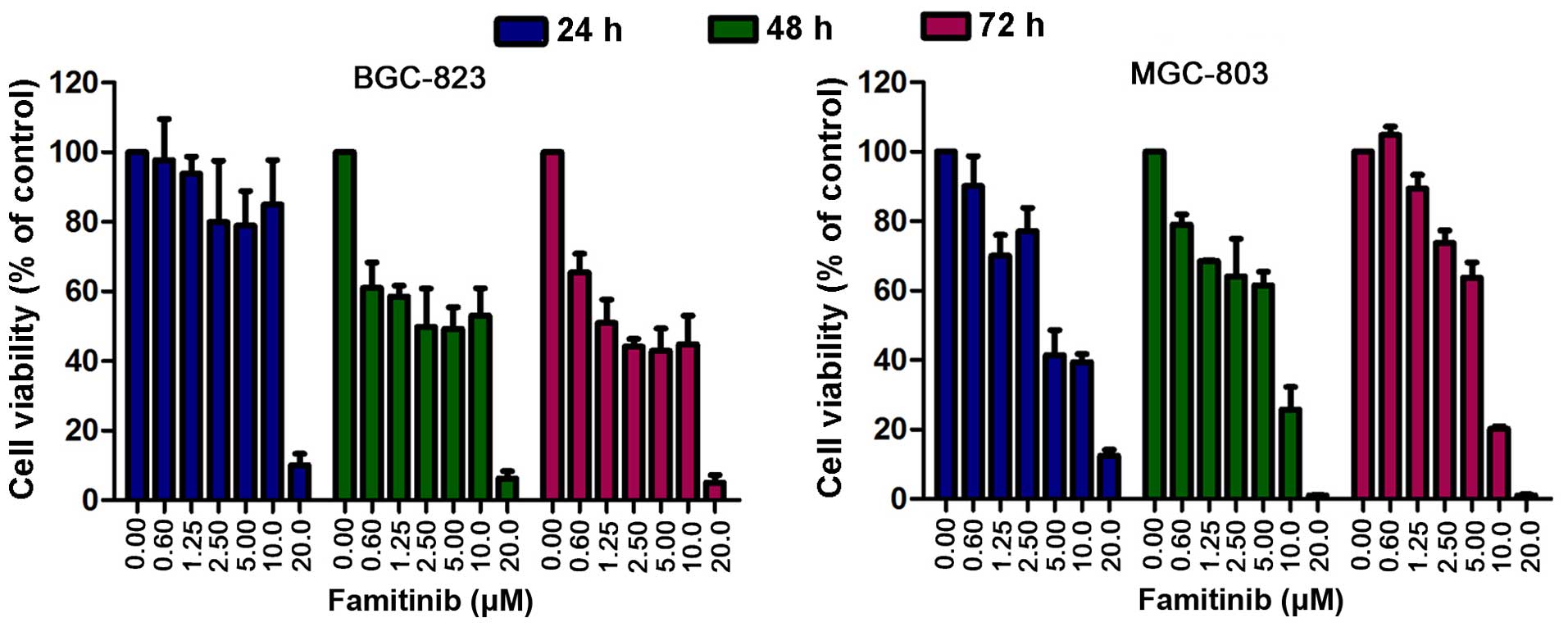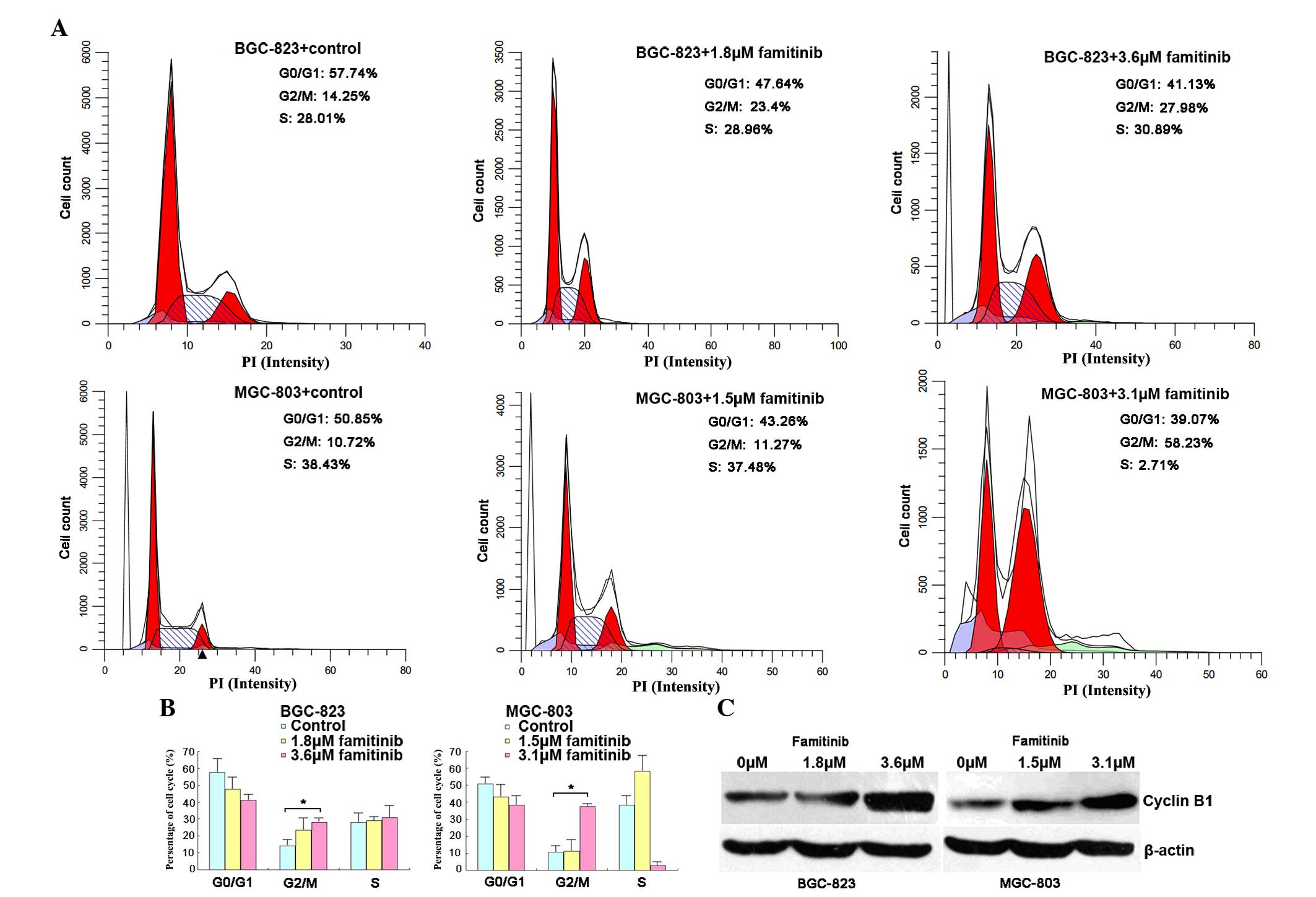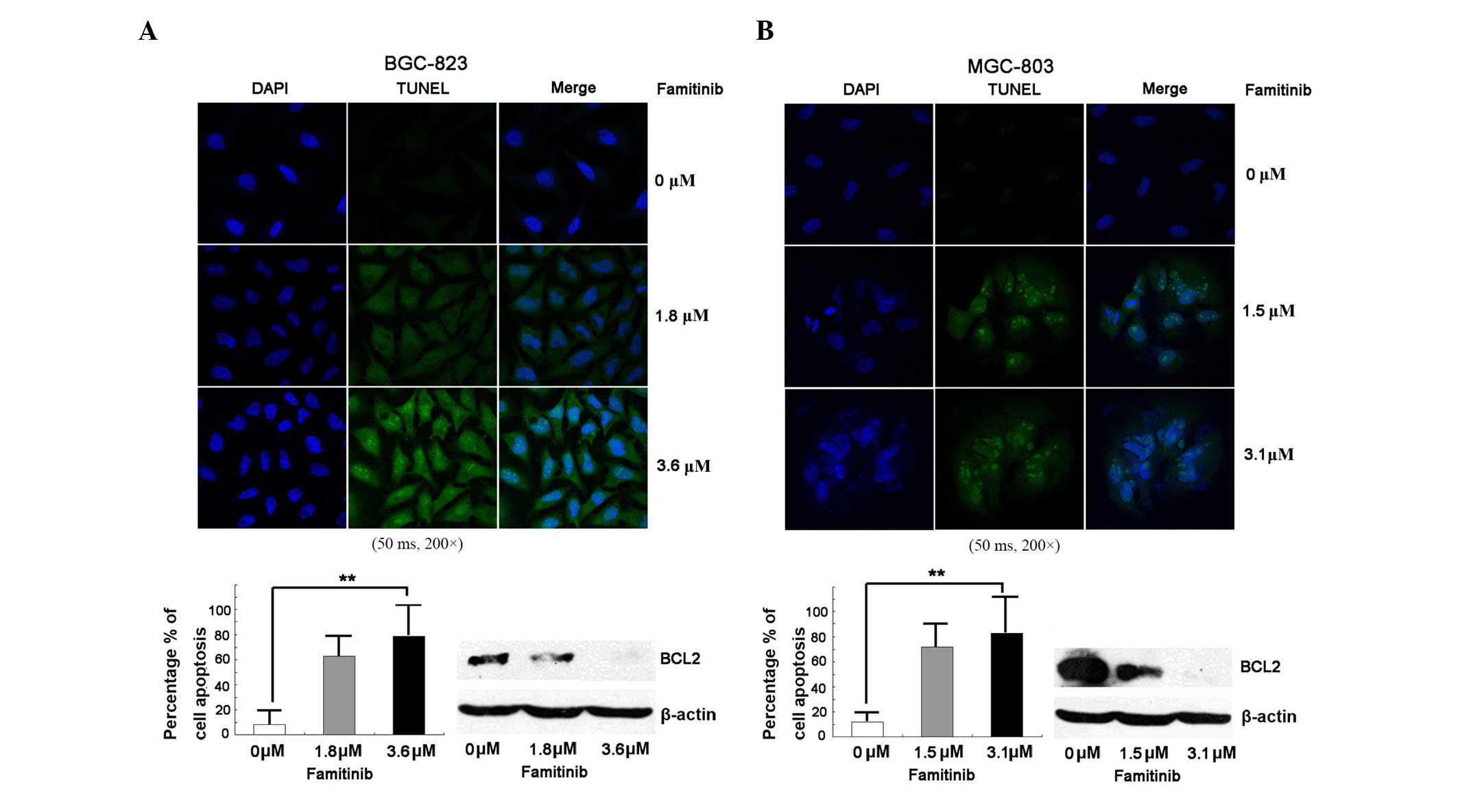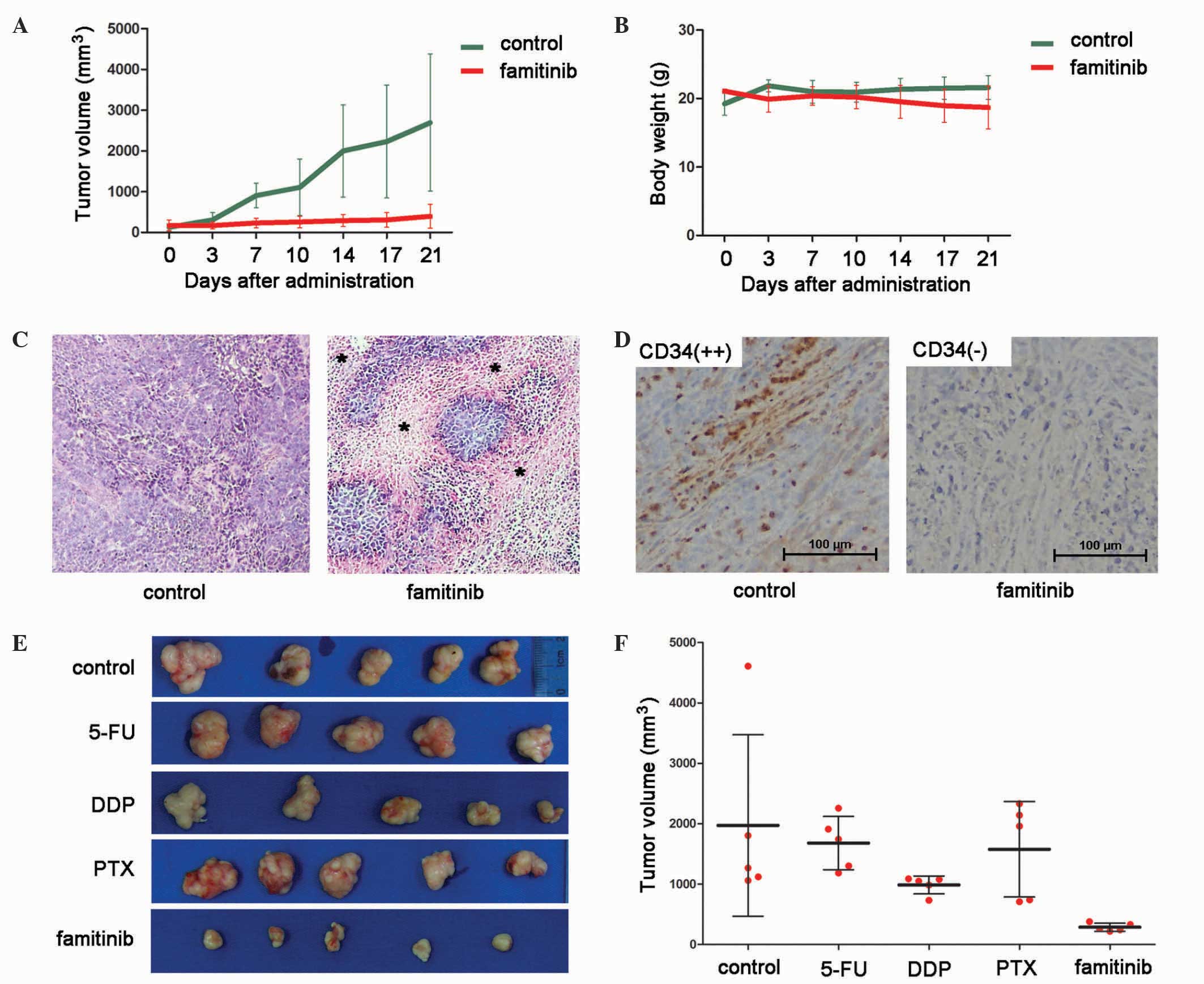|
1
|
Ferlay J, Soerjomataram I, Dikshit R, Eser
S, Mathers C, Rebelo M, Parkin DM, Forman D and Bray F: Cancer
incidence and mortality worldwide: Sources, methods and major
patterns in GLOBOCAN 2012. Int J Cancer. 136:E359–E386. 2015.
View Article : Google Scholar : PubMed/NCBI
|
|
2
|
Ajani JA, Bentrem DJ, Besh S, D'Amico TA,
Das P, Denlinger C, Fakih MG, Fuchs CS, Gerdes H, Glasgow RE, et
al: National Comprehensive Cancer Network: Gastric cancer, version
2.2013: featured updates to the NCCN Guidelines. J Natl Compr Canc
Netw. 11:531–546. 2013.PubMed/NCBI
|
|
3
|
Shen L, Shan YS, Hu HM, Price TJ, Sirohi
B, Yeh KH, Yang YH, Sano T, Yang HK, Zhang X, et al: Management of
gastric cancer in Asia: Resource-stratified guidelines. Lancet
Oncol. 14:e535–e547. 2013. View Article : Google Scholar : PubMed/NCBI
|
|
4
|
Bang YJ, Van Cutsem E, Feyereislova A,
Chung HC, Shen L, Sawaki A, Lordick F, Ohtsu A, Omuro Y, Satoh T,
et al: Trastuzumab in combination with chemotherapy versus
chemotherapy alone for treatment of HER2-positive advanced gastric
or gastro-oesophageal junction cancer (ToGA): A phase 3,
open-label, randomised controlled trial. Lancet. 376:687–697. 2010.
View Article : Google Scholar : PubMed/NCBI
|
|
5
|
Druker BJ, Tamura S, Buchdunger E, Ohno S,
Segal GM, Fanning S, Zimmermann J and Lydon NB: Effects of a
selective inhibitor of the Abl tyrosine kinase on the growth of
Bcr-Abl positive cells. Nat Med. 2:561–566. 1996. View Article : Google Scholar : PubMed/NCBI
|
|
6
|
Barker AJ, Gibson KH, Grundy W, Godfrey
AA, Barlow JJ, Healy MP, Woodburn JR, Ashton SE, Curry BJ, Scarlett
L, et al: Studies leading to the identification of ZD1839 (IRESSA):
An orally active, selective epidermal growth factor receptor
tyrosine kinase inhibitor targeted to the treatment of cancer.
Bioorg Med Chem Lett. 11:1911–1914. 2001. View Article : Google Scholar : PubMed/NCBI
|
|
7
|
Perez-Soler R: The role of erlotinib
(Tarceva, OSI 774) in the treatment of non-small cell lung cancer.
Clin Cancer Res. 10:4238s–4240s. 2004. View Article : Google Scholar : PubMed/NCBI
|
|
8
|
Rask-Andersen M, Zhang J, Fabbro D and
Schiöth HB: Advances in kinase targeting: Current clinical use and
clinical trials. Trends Pharmacol Sci. 35:604–620. 2014. View Article : Google Scholar : PubMed/NCBI
|
|
9
|
Yang W, Raufi A and Klempner SJ: Targeted
therapy for gastric cancer: Molecular pathways and ongoing
investigations. Biochim Biophys Acta. 1846:232–237. 2014.PubMed/NCBI
|
|
10
|
Lou L, Mi Y, Xu Y, Xie C and Zhao H:
Preclinical antitumor study of famitinib, an orally available
multi-targeted kinase inhibitor of VEGFR/PDGFR/c-Kit in phase I
clinical trials. Proceedings of AACR 102nd Annual Meeting (Cancer
Res, Orlando, FL). 712011.
|
|
11
|
Zhou A, Zhang W, Chang C, Chen X, Zhong D,
Qin Q, Lou D, Jiang H and Wang J: Phase I study of the safety,
pharmacokinetics and antitumor activity of famitinib. Cancer
Chemother Pharmacol. 72:1043–1053. 2013. View Article : Google Scholar : PubMed/NCBI
|
|
12
|
Zhang W, Zhou AP, Qin Q, Chang CX, Jiang
HY, Ma JH and Wang JW: Famitinib in metastatic renal cell
carcinoma: A single center study. Chin Med J (Engl). 126:4277–4281.
2013.PubMed/NCBI
|
|
13
|
Xie C, Zhou J, Guo Z, Diao X, Gao Z, Zhong
D, Jiang H, Zhang L and Chen X: Metabolism and bioactivation of
famitinib, a novel inhibitor of receptor tyrosine kinase, in cancer
patients. Br J Pharmacol. 168:1687–1706. 2013. View Article : Google Scholar : PubMed/NCBI
|
|
14
|
Cao J, Zhang J, Wang Z, Wang B, Lv F, Wang
L and Hu X: Hypothyroidism as a potential biomarker of efficacy of
famitinib, a novel VEGFR-2 inhibitor in metastatic breast cancer.
Cancer Chemother Pharmacol. 74:389–398. 2014. View Article : Google Scholar : PubMed/NCBI
|
|
15
|
He Q, Gao J, Ge S, Wang T, Li Y, Peng Z,
Li Y and Shen L: Axitinib alone or in combination with
chemotherapeutic drugs exerts potent antitumor activity against
human gastric cancer cells in vitro and in vivo. J Cancer Res Clin
Oncol. 140:1575–1583. 2014. View Article : Google Scholar : PubMed/NCBI
|
|
16
|
Shen L, Shan YS, Hu HM, Price TJ, Sirohi
B, Yeh KH, Yang YH, Sano T, Yang HK, Zhang X, et al: Management of
gastric cancer in Asia: Resource-stratified guidelines. Lancet
Oncol. 14:e535–e547. 2013. View Article : Google Scholar : PubMed/NCBI
|
|
17
|
Folkman J: Tumor angiogenesis: Therapeutic
implications. N Engl J Med. 285:1182–1186. 1971. View Article : Google Scholar : PubMed/NCBI
|
|
18
|
Shen L, Li J, Xu J, Pan H, Dai G, Qin S,
Wang L, Wang J, Yang Z, Shu Y, et al: Bevacizumab plus capecitabine
and cisplatin in Chinese patients with inoperable locally advanced
or metastatic gastric or gastroesophageal junction cancer:
Randomized, double-blind, phase III study (AVATAR study). Gastric
Cancer. 18:168–176. 2015. View Article : Google Scholar : PubMed/NCBI
|
|
19
|
Ohtsu A, Shah MA, Van Cutsem E, Rha SY,
Sawaki A, Park SR, Lim HY, Yamada Y, Wu J, Langer B, et al:
Bevacizumab in combination with chemotherapy as first-line therapy
in advanced gastric cancer: A randomized, double-blind,
placebo-controlled phase III study. J Clin Oncol. 29:3968–3976.
2011. View Article : Google Scholar : PubMed/NCBI
|
|
20
|
Martin-Richard M, Gallego R, Pericay C,
Foncillas Garcia J, Queralt B, Casado E, Barriuso J, Iranzo V, Juez
I, Visa L, et al: Multicenter phase II study of oxaliplatin and
sorafenib in advanced gastric adenocarcinoma after failure of
cisplatin and fluoropyrimidine treatment. A GEMCAD study. Invest
New Drugs. 31:1573–1579. 2013. View Article : Google Scholar : PubMed/NCBI
|
|
21
|
Ilson DH: Angiogenesis in gastric cancer:
Hitting the target? Lancet. 383:4–6. 2014. View Article : Google Scholar : PubMed/NCBI
|
|
22
|
Fuchs CS, Tomasek J, Yong CJ, Dumitru F,
Passalacqua R, Goswami C, Safran H, dos Santos LV, Aprile G, Ferry
DR, et al: Ramucirumab monotherapy for previously treated advanced
gastric or gastro-oesophageal junction adenocarcinoma (REGARD): An
international, randomised, multicentre, placebo-controlled, phase
III trial. Lancet. 383:31–39. 2014. View Article : Google Scholar : PubMed/NCBI
|
|
23
|
Li J, Qin S, Xu J, Guo W, Xiong J, Bai Y,
Sun G, Yang Y, Wang L, Xu N, et al: Apatinib for
chemotherapy-refractory advanced metastatic gastric cancer: Results
from a randomized, placebo-controlled, parallel-arm, phase II
trial. J Clin Oncol. 31:3219–3225. 2013. View Article : Google Scholar : PubMed/NCBI
|


















